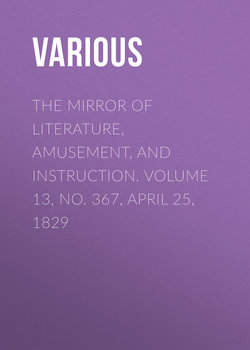Читать книгу The Mirror of Literature, Amusement, and Instruction. Volume 13, No. 367, April 25, 1829 - Various - Страница 2
SUSSEX PLACE, REGENT'S PARK
TRANSLATION OF AN IRISH DEED OF GIFT
Оглавление(To the Editor of the Mirror.)
The original deed, of which the subjoined is a translation, was found among some old records in Birmingham Tower, Castle of Dublin, when that building was taken down in the year 1772. It is in Irish, neatly written on a long scroll of parchment; forty-two seals are attached to the side, but the only signature is that of the chief at bottom. This document, among other curious matter, furnishes us with a proof, that the chiefs of clans were elective, contrary to the opinions of modern authors, and more especially of our modern historical novelists; which latter speak of them as hereditary feudal lords, and even talk of their estates descending to their daughters; although under the system of clanship, females could not inherit, and no man could have more than a life interest in his estate. Here we have an instance of a chief divesting himself of the dignity of office, and joining in the transfer of it to another, when such transfer was considered likely to further the interests of the clan. It is also interesting, as showing the manner in which the English government in Dublin proceeded in the subjugation of Ireland, by embroiling its septs with one another.
The Mac Ranalds, or Magranals, (as the name was usually written,) in English, Reynolds, the principal parties to the deed, were a clan who possessed the territory of Munterolish, in the county of Leitrim, subordinate to O'Rourke, who was lord paramount of the county; and the lords justices having, by this deed, detached them from the interest of the latter, immediately marched an army into his country. O'Rourke, after a protracted, but ineffectual resistance, was made prisoner and sent to London, where he was executed, in the early part of the reign of Queen Elizabeth; "going to death," says Camden, "with as little concern as if he had been merely a spectator." The county was then declared a forfeiture to the crown, and the estates of its old proprietors (including those of the Magranals among the rest) parcelled out among a colony of English settlers, then for the first time seated in the county. This is the first document known, in which Leitrim is spoken of as a county; and it is generally said not to have been made such till the time of James I.; it was more anciently known as the territory of Briefné O'Rourke.
Although Henry II. is said to have conquered Ireland, the dominion of the English monarchs there was little better than nominal prior to the reign of James I. Great pains had been taken by different sovereigns to reduce the Irish to a perfect submission to the English crown; and English colonies had, from time to time, been planted, with that view, in different parts of the country; these colonies, however, in a generation or two, had uniformly "degenerated," as the phrase was; that is, had become Irish, both in manners and feelings, using the Irish tongue, and even coining for themselves Irish surnames, as if desirous of forgetting their English origin. Henry VIII. was the first English monarch who assumed the title of king of Ireland; and his daughter Mary set about the conquest of the country in earnest, by reducing the countries of Ive Faily and Leix, which were formed into the King's and Queen's Counties, so called in compliment to the queen, and her husband, Philip of Spain. Her lord deputy, Sir Anthony Bellingham, writing on this occasion to her highness, says that he "had made good progress in civilizing the barbarous inhabitants of those counties, having reduced their numbers to less than one hundred fighting men."
The territory of Leitrim, though as yet uninvaded, was at the same time declared a county; and the Magranals, who had probably no wish to be "civilized" on Sir Anthony's plan, appear to have endeavoured to avert the coming storm, by employing an agent in Dublin, at an immense expense, considering the scarcity of money in Ireland in those days, "to advocate their cause with the lords justices and council:" or, in plain English, to crave permission to be allowed to remain in quiet. The person chosen was one of their own sept, John Magranal, a soldier of fortune, who, having served in the English army in the subjugation of the King's and Queen's counties, had been rewarded with a grant of the forfeited lands of Claduff, in the former county, and was supposed to stand well with the lords justices. Him they elected their chief. With what success he advocated their cause has been already stated.
The late George Nugent Reynolds, the dramatist, was a member of the sept of the Magranals; as was the notorious Tom Reynolds, the informer, well known in the history of the rebellion of 1798.
There is a copy of this deed in the library of the Duke of Buckingham, at Stow.
H.S.
